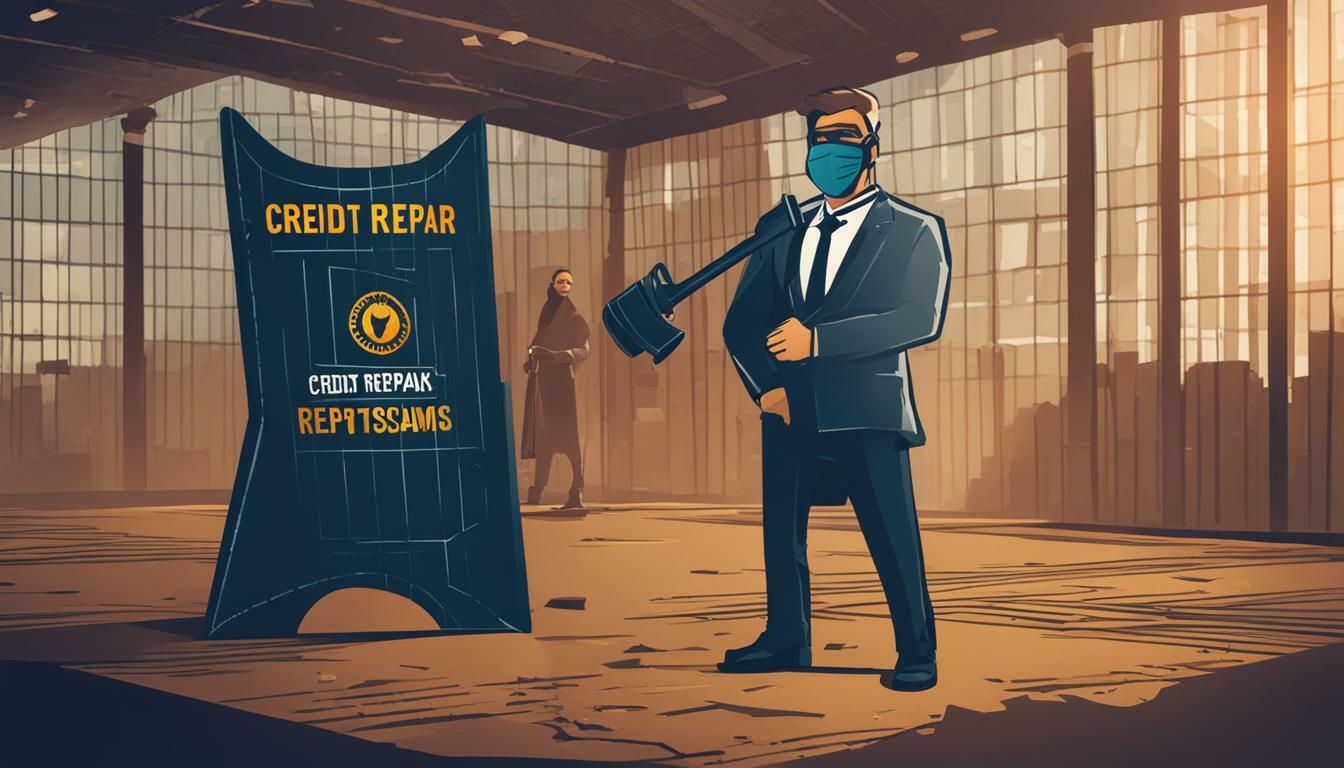Guard Your Finances: Advice on Avoiding Credit Repair Scams

Protecting your financial health is crucial, and one way to do so is by avoiding credit repair scams. Some companies prey on vulnerable individuals, employing illegal tactics to improve credit scores. These fraudulent practices can range from charging upfront fees without providing any services to filing false police or identity theft reports to manipulate credit information.
It is important to note that credit repair companies should not suggest lying about credit history or make guarantees of specific score increases. Additionally, any recommendation to use Credit Privacy Numbers (CPN) or employee identification numbers (EIN) as a way to start fresh should be viewed with caution, as this can involve fraudulent activity and legal consequences.
To identify credit repair scams, consumers should be wary of red flags such as upfront fees, promises to delete all negative information, guarantees of specific score increases or timelines, suggestions to use CPNs or EINs, offers to sell tradelines or authorized user accounts, and failure to inform clients about free options for disputing credit report errors.
Thorough research is crucial when considering credit repair companies. During an initial consultation, it is important to ask specific questions and gather as much information as possible. Seeking help from credit counseling agencies can also be a viable alternative to credit repair companies. These agencies can negotiate with creditors for more affordable payment plans and provide guidance on budgeting and building good credit.
- Protect your finances by avoiding credit repair scams.
- Be cautious of companies charging upfront fees without providing services.
- Avoid credit repair companies that guarantee specific score increases or timelines.
- Do not entertain suggestions to use Credit Privacy Numbers (CPNs) or employee identification numbers (EINs).
- Seek help from credit counseling agencies for assistance in negotiating payment plans and building good credit.
Understanding Credit Repair Scams: Warning Signs and Red Flags
It’s important to be able to recognize the warning signs and red flags of credit repair scams to avoid becoming a victim. Some unscrupulous credit repair companies employ illegal tactics to deceive and defraud consumers. By understanding these warning signs, you can protect yourself and make informed decisions about your financial well-being.
🚨 TUIC Errors + Low Credit Score?
CreditScoreIQ helps you build credit faster by reporting utility bills to all 3 bureaus—while you dispute errors.
Start Building Credit Today →One key red flag is when a credit repair company asks for upfront fees before providing any services. According to the federal Credit Repair Organizations Act (CROA), it is illegal for credit repair companies to charge upfront fees for credit repair services. Legitimate companies will only charge fees after they have rendered the agreed-upon services.
Another warning sign to watch out for is any company that guarantees to delete all negative information from your credit report or promises specific score increases within a short timeframe. Repairing credit takes time and there are no quick fixes. Avoid companies that make extravagant promises or guarantees, as these claims are often too good to be true.
Additionally, be cautious of any credit repair company that suggests using Credit Privacy Numbers (CPNs) or employee identification numbers (EINs) as a way to start fresh with a clean credit history. This practice is fraudulent and can have serious legal consequences, including potential charges of identity theft. Legitimate credit repair companies will not recommend or engage in such activities.

Recognizing these warning signs can help you steer clear of credit repair scams and protect your financial well-being. It is important to thoroughly research any credit repair company before engaging their services. Ask specific questions during an initial consultation to ensure the company is legitimate and transparent in its practices. Remember, repairing your credit takes time and careful consideration of the available options. Seeking help from credit counseling agencies can be an alternative approach to credit repair, as they can negotiate with creditors for more affordable payment plans and provide guidance on budgeting and building good credit.
Key warning signs of credit repair scams:
- Requesting upfront fees before providing any services
- Guarantees to delete all negative information or promises of specific score increases
- Suggestions to use Credit Privacy Numbers (CPNs) or employee identification numbers (EINs)
- Offers to sell tradelines or authorized user accounts
- Failure to inform clients about free options for disputing credit report errors
By staying vigilant and informed, you can protect yourself from falling victim to credit repair scams and make informed decisions about your financial future.
How to Protect Yourself from Credit Repair Scams
Safeguarding yourself from credit repair scams requires being proactive and taking specific precautions. With fraudulent companies out there, it’s crucial to educate yourself on the warning signs and red flags to watch out for. Here are some key steps you can take to protect yourself:
- Do thorough research: Before engaging with any credit repair company, do your due diligence. Look for reviews, ratings, and complaints online. Check if the company is accredited by trustworthy organizations like the Better Business Bureau.
- Ask the right questions: During the initial consultation, don’t hesitate to ask specific questions about the company’s services, fees, and guarantees. Legitimate credit repair companies should be transparent and provide you with detailed information.
- Be wary of upfront fees: According to the Credit Repair Organizations Act (CROA), credit repair companies are prohibited from charging upfront fees before they have performed any services. If a company insists on payment upfront, it may be a sign of a scam.
- Recognize unrealistic promises: Credit repair is a process that takes time and effort. Be cautious of any company that guarantees to delete all negative information from your credit report or promises specific score increases within a short timeframe. Legitimate companies cannot guarantee such outcomes.
- Explore alternatives: If you’re skeptical about credit repair companies, consider seeking help from credit counseling agencies. These nonprofit organizations provide guidance on managing debt, negotiating payment plans with creditors, and building a positive credit history.
Remember, protecting yourself from credit repair scams starts with being informed and vigilant. By taking these precautions, you can safeguard your finances and make informed decisions when it comes to repairing your credit. Stay cautious and remember that repairing your credit is a journey that requires careful consideration of your options.

If you’re wary of credit repair companies, there are alternative options available, such as seeking help from credit counseling agencies. These agencies specialize in assisting individuals in improving their credit scores and managing their finances more effectively. Unlike credit repair companies that often charge upfront fees and make unrealistic promises, credit counseling agencies work with individuals to develop personalized plans for debt repayment and financial stability.
One of the primary advantages of credit counseling agencies is their ability to negotiate with creditors on behalf of their clients. They can help lower interest rates, waive fees, and establish more affordable payment plans, making it easier for individuals to manage their debt. Moreover, credit counseling agencies provide valuable guidance on budgeting, helping individuals create realistic spending plans and prioritize debt repayment.
In addition to negotiating with creditors and providing budgeting assistance, credit counseling agencies also offer educational resources and workshops to help individuals build and maintain a positive credit history. These resources cover various topics, including understanding credit reports, managing credit cards responsibly, and avoiding common credit mistakes. By equipping individuals with the knowledge and tools necessary to make informed financial decisions, credit counseling agencies empower them to take control of their financial futures.
If you’re considering seeking help from a credit counseling agency, it’s essential to do your research and choose a reputable organization. Look for agencies that are accredited by organizations such as the National Foundation for Credit Counseling (NFCC) or the Financial Counseling Association of America (FCAA). These accreditations ensure that the agency meets high standards of professionalism and ethical conduct.
Remember, repairing credit takes time and requires careful consideration of available options. By working with a credit counseling agency, you can receive expert guidance and support as you navigate your path to financial stability. So, protect yourself from credit repair scams by exploring the alternative option of credit counseling agencies.

Conclusion
By following the tips and advice outlined in this article, you can significantly reduce the risk of falling victim to credit repair scams and safeguard your finances for a more secure future.
Guarding your finances against credit repair scams is crucial to avoid falling prey to fraudulent practices. Some credit repair companies take advantage of consumers in vulnerable situations and resort to illegal methods to improve credit scores.
One common scam is when companies take upfront fees but provide no services in return, violating the federal Credit Repair Organizations Act (CROA). Fraudulent companies may also file false police or identity theft reports to manipulate credit information, which is illegal and can backfire when uncovered.
Furthermore, credit repair companies should not suggest lying about credit history or make guarantees of specific score increases. Another red flag is when companies recommend using Credit Privacy Numbers (CPN) or employee identification numbers (EIN) as a way to start fresh, as this can involve fraudulent activity and legal consequences.
To spot credit repair scams, consumers should be wary of upfront fees, promises to delete all negative information, guarantees of specific score increases or timelines, suggestions to use CPNs or EINs, offers to sell tradelines or authorized user accounts, and failure to inform clients about free options for disputing credit report errors.
It’s crucial to do thorough research on companies and ask specific questions during an initial consultation. Seeking help from credit counseling agencies can be an alternative to credit repair companies, as they can negotiate with creditors for more affordable payment plans and offer guidance on budgeting and building good credit.
Ultimately, repairing credit takes time and requires careful consideration of available options. By following the tips and advice outlined in this article, you can significantly reduce the risk of falling victim to credit repair scams and safeguard your finances for a more secure future.
FAQ
Q: Why is it important to guard against credit repair scams?
A: Guarding against credit repair scams is crucial to protect your finances and avoid falling victim to fraudulent practices.
Q: What are some warning signs of credit repair scams?
A: Warning signs of credit repair scams include upfront fees with no services provided, guarantees of specific score increases, suggestions to use Credit Privacy Numbers (CPNs) or employee identification numbers (EINs), and failure to inform clients about free credit report dispute options.
Q: How can I protect myself from credit repair scams?
A: To protect yourself from credit repair scams, do thorough research on companies, ask specific questions during an initial consultation, be wary of upfront fees and guarantees, and avoid using CPNs or EINs.
Q: Are there alternatives to credit repair companies?
A: Yes, credit counseling agencies can provide assistance in negotiating payment plans with creditors, offer guidance on budgeting, and help in building a positive credit history.
Ready to Improve Your Credit?
Disputing TUIC errors is step one. Step two? Boost your score by reporting utility payments with CreditScoreIQ.
Get Started Now (Only $1 Trial) →3-bureau reporting • $1M identity insurance • Dark web monitoring



